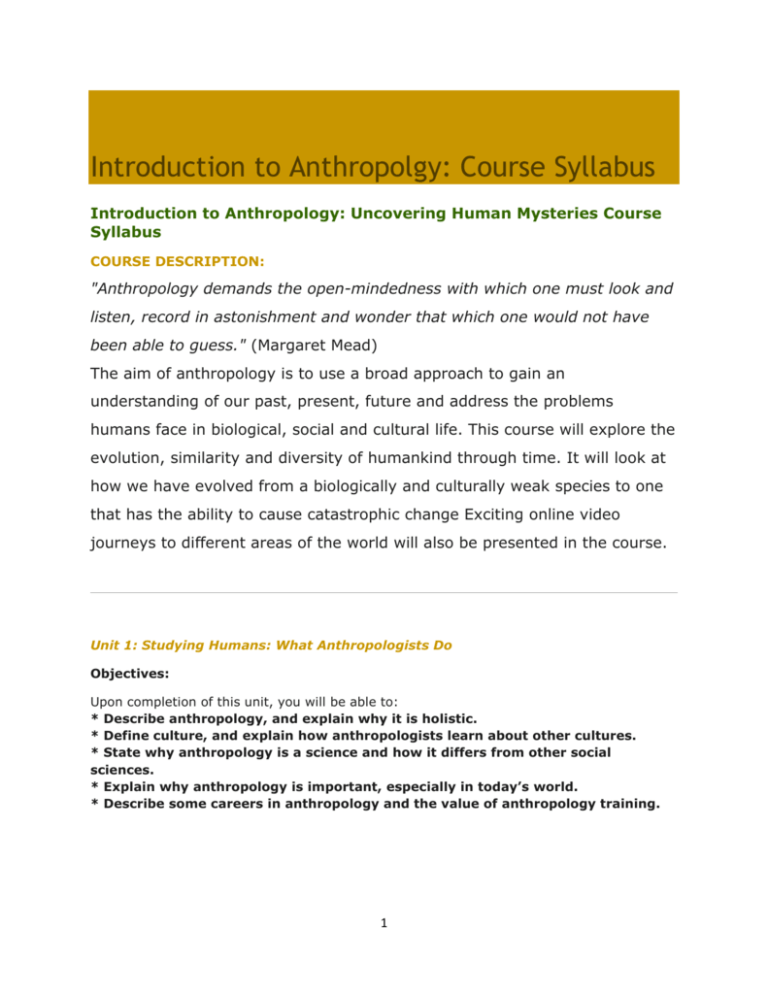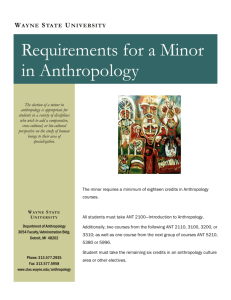
Introduction to Anthropolgy: Course Syllabus
Introduction to Anthropology: Uncovering Human Mysteries Course
Syllabus
COURSE DESCRIPTION:
"Anthropology demands the open-mindedness with which one must look and
listen, record in astonishment and wonder that which one would not have
been able to guess." (Margaret Mead)
The aim of anthropology is to use a broad approach to gain an
understanding of our past, present, future and address the problems
humans face in biological, social and cultural life. This course will explore the
evolution, similarity and diversity of humankind through time. It will look at
how we have evolved from a biologically and culturally weak species to one
that has the ability to cause catastrophic change Exciting online video
journeys to different areas of the world will also be presented in the course.
Unit 1: Studying Humans: What Anthropologists Do
Objectives:
Upon completion of this unit, you will be able to:
* Describe anthropology, and explain why it is holistic.
* Define culture, and explain how anthropologists learn about other cultures.
* State why anthropology is a science and how it differs from other social
sciences.
* Explain why anthropology is important, especially in today’s world.
* Describe some careers in anthropology and the value of anthropology training.
1
ASSIGNMENTS:
Studying Humans: What
Anthropologists Do: Unit Text
Questions
Homework
10 points
Studying Humans: What
Anthropologists Do: Online
Anthropology Lab Questions
Homework
10 points
Unit 1 Discussion Assignment 1
Discussion
5 points
Unit 1 Discussion Assignment 2
Discussion
5 points
Quiz
15 points
Unit 1 Quiz: Studying Humans: What
Anthropologists Do
Unit 2: Culture & Language: Why Humans Are Special
Objectives:
Upon completion of this unit, you will be able to:
* Define culture, and list cultural universals.
* Give examples of material, social, and ideological culture.
* Explain why art is an important part of culture.
* Identify ways that people acquire culture.
* List traits of human language.
* Outline the origin of human language.
* Describe modern human languages.
* State how language influences thought.
2
ASSIGNMENTS:
Culture & Language: Why Humans
Are Special: Unit Text Questions
Homework
10 points
Culture & Language: Why Humans
Are Special: Online Anthropology Lab
Questions
Homework
10 points
Unit 2 Discussion Assignment 1
Discussion
5 points
Unit 2 Discussion Assignment 2
Discussion
5 points
Quiz
15 points
Unit 2 Quiz: Culture & Language: Why
Humans Are Special
Unit 3: Human Evolution: How We Got Here
Objectives:
Upon completion of this unit, you will be able to:
* State how and why evolution occurs.
* Identify different types of evidence for evolution.
* Outline the events of early primate evolution.
* Describe the Australopithecines and their role in human evolution.
* Identify early species of Homo, including their traits and distribution.
* Describe where and when Homo sapiens evolved.
* Identify the Neandertals and what may have happened to them.
3
ASSIGNMENTS:
Human Evolution: How We Got
Here; Unit Text Questions
Homework
10 points
Human Evolution: How We Got
Here: Online Anthropology Lab
Questions
Homework
10 points
Unit 3 Discussion Assignment 1
Discussion
5 points
Unit 3 Discussion Assignment 2
Discussion
5 points
Quiz
15 points
Unit 3 Quiz: Human Evolution: How
We Got Here
Unit 4: The Human Animal: Who We Are
Objectives:
Upon completion of this unit, you will be able to:
* Describe how humans are classified in the animal kingdom, and name our
closest living relatives.
* Identify biological traits that define the human species, and explain how they
are related to culture.
* Describe ways that humans vary, and explain why racial classifications are not
useful.
4
ASSIGNMENTS:
The Human Animal: Who We Are:
Unit Text Questions
Homework
10 points
The Human Animal: Who We Are:
Online Anthropology Lab Questions
Homework
10 points
Unit 4 Discussion Assignment 1
Discussion
5 points
Unit 4 Discussion Assignment 2
Discussion
5 points
Unit 4 Quiz: The Human Animal:
Who We Are
Quiz
15 points
5
Anthropology Midterm Exam
Objectives:
Upon completion of this unit, you will be able to:
* Review information acquired and mastered from this course up to this point.
* Take a course exam based on material from the first four units in this course
(Note: You will be able to open this exam only one time.)
ASSIGNMENT:
Anthropology Midterm Exam
Midterm Discussion Assignment
Exam
50 points
Discussion
5 points
Unit 5: All About Food: What We Do in Order to Eat
Objectives:
Upon completion of this unit, you will be able to:
* Describe cuisines of different cultures.
* Identify cultural differences in eating habits.
* Contrast four basic types of subsistence strategy.
* Explain how subsistence strategy influences other aspects of culture.
* Describe social purposes served by food.
ASSIGNMENTS:
All About Food: What We Do in Order
to Eat: Unit Text Questions
Homework
10 points
The Human Animal: Who We Are
Online Anthropology Lab Questions
Homework
10 points
6
Unit 5 Discussion Assignment 1
Discussion
5 points
Unit 5 Discussion Assignment 2
Discussion
5 points
Quiz
15 points
Unit 5 Quiz: All About Food: What We
Do in Order to Eat
Unit 6: Material Culture: How Humans Are Handy
Objectives:
Upon completion of this unit, you will be able to:
* Define archeology and the archeological record.
* Identify the types of material remains that people leave behind.
* Outline how archeologists find and excavate sites.
* Explain how archeologists analyze and interpret what they discover.
* Describe the earliest evidence of culture that was left behind by human
ancestors.
* State when and how agriculture first developed.
* Describe other changes that agriculture brought.
ASSIGNMENTS:
Material Culture: How Humans Are
Handy: Unit Text Questions
Homework
10 points
Material Culture: How Humans Are
Handy: Online Anthropology Lab
Questions
Homework
10 points
Unit 6 Discussion Assignment 1
Discussion
5 points
7
Unit 6 Discussion Assignment 2
Unit 6 Quiz: Material Culture: How
Humans Are Handy
Discussion
5 points
Quiz
15 points
Unit 7: Family Ties & Social Bonds: What Keeps Us Together
Objectives:
Upon completion of this unit, you will be able to:
* Identify types of marriage rules and forms of marriage.
* Explain how residence patterns are related to household makeup.
* Describe different ways to trace relationships and name kin.
* Explain the importance of social groups and how social behavior is controlled.
* Compare and contrast different types of human societies.
ASSIGNMENTS:
Family Ties & Social Bonds: What
Keeps Us Together: Unit Text
Questions
Homework
10 points
Family Ties & Social Bonds: What
Keeps Us Together: Online
Anthropology Lab Questions
Homework
10 points
Unit 7 Discussion Assignment 1
Discussion
5 points
Unit 7 Discussion Assignment 2
Discussion
5 points
8
Unit 7 Quiz: Family Ties & Social
Bonds: What Keeps Us Together
Quiz
15 points
Unit 8: Religion: What We Believe
Objectives:
Upon completion of this unit, you will be able to:
* Religious myths (what they are; examples)
* Supernatural beings (what they are; examples)
* Religious practices (e.g., rituals, rites of passage, magic, sorcery, divination)
* Moral codes (what they are; examples)
ASSIGNMENTS:
Religion: What We Believe: Unit
Text Questions
Homework
10 points
Religion: What We Believe: Online
Anthropology Lab Questions
Homework
10 points
Unit 8 Discussion Assignment 1
Discussion
5 points
Unit 8 Discussion Assignment 2
Discussion
5 points
Unit 8 Quiz: Religion: What We
Believe
Quiz
15 points
9
Anthropology Final Exam
Objectives:
Upon completion of this unit, you will be able to:
* Review information acquired and mastered from this course up to this point.
* Take a course exam based on material from units five to eight in this course –
the last four units. (Note: You will be able to open this exam only one time.)
ASSIGNMENT:
Anthropology Final Exam
Class Reflection Discussion
Assignment
Exam
50 points
Discussion
10 points
© eDynamic Learning Inc. | All Rights Reserved.
10








